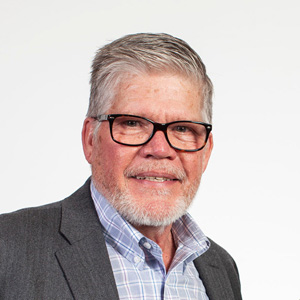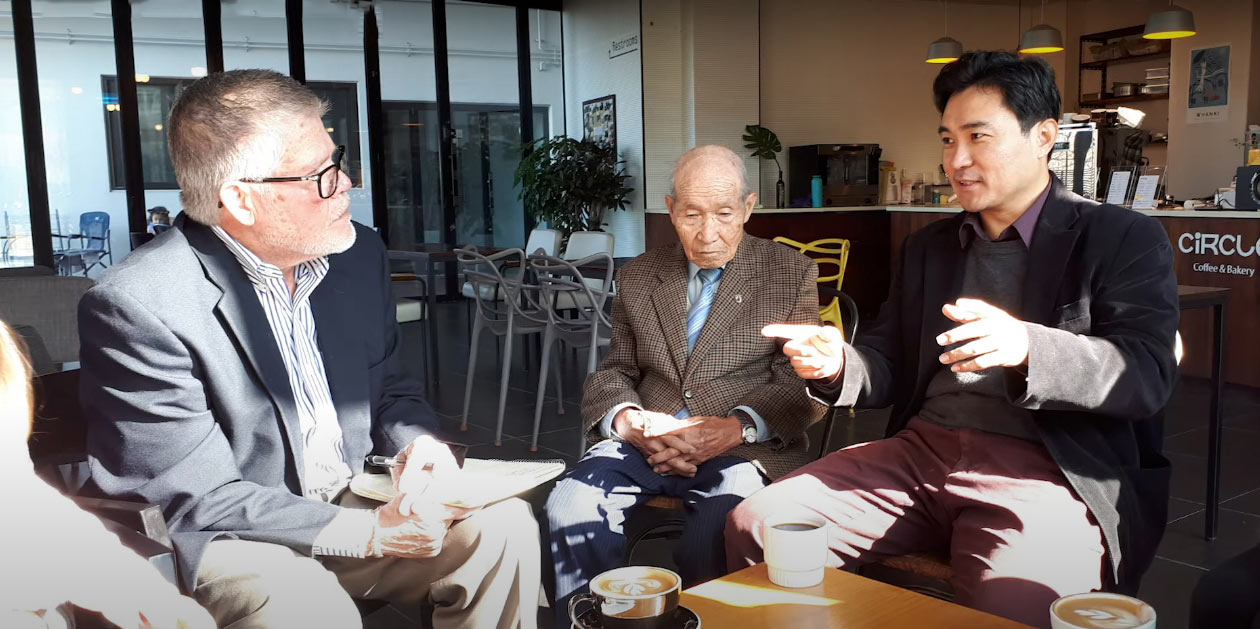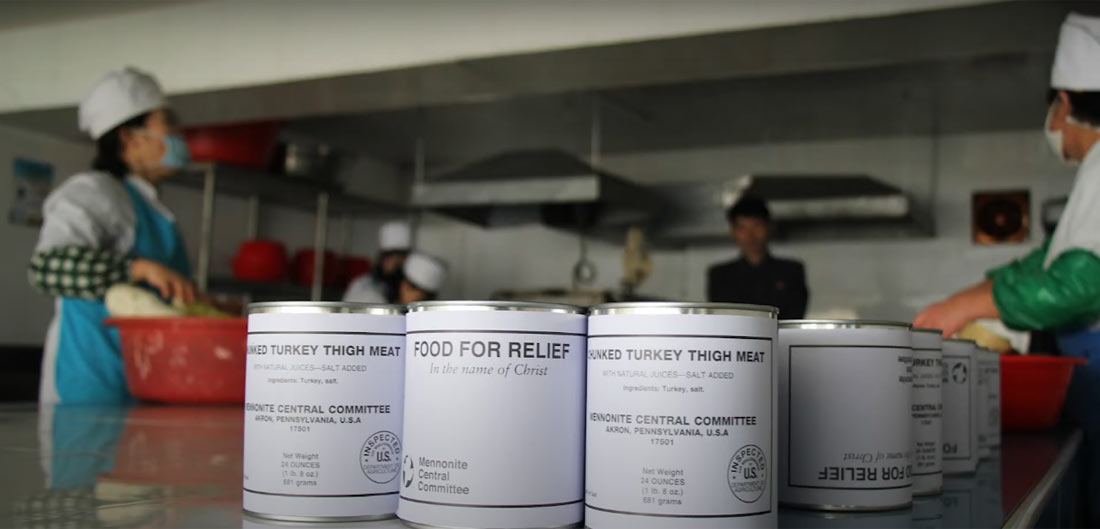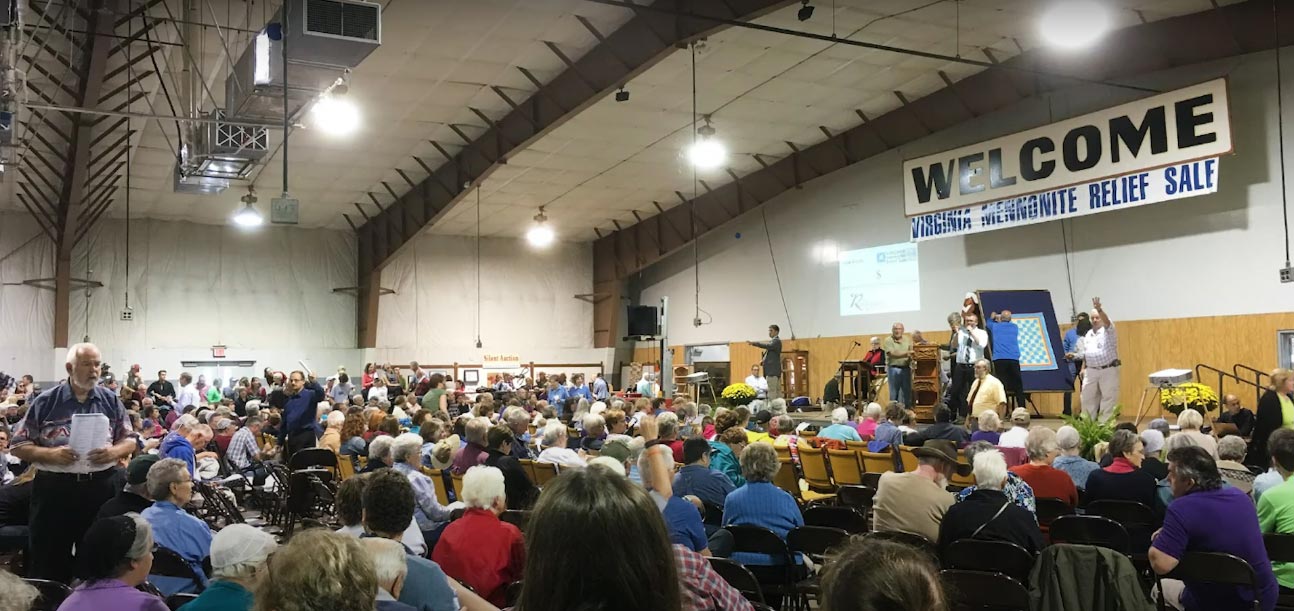
Living as Those Made Alive in Christ
by Ron Byler
Mennonite Central Committee Executive Director
Mennonite Central Committee was featured at the 2020 Virginia Mennonite Conference Assembly as Executive Director Ron Byler gave two presentations on MCC’s work, past and present, to VMC delegates. MCC is celebrating its centennial year in 2020. The following article is based on his presentations. Watch the videos from Assembly.
All photos captured from video
Greetings from Mennonite Central Committee! I am Ron Byler, executive director of MCC U.S., and I want to thank you for all that you are doing to help keep MCC’s ministries through the churches strong and vibrant around the world. You have played a key role in MCC’s story through these years.
As we celebrate 100 years of relief in the name of Christ, we chose this text from 2 Corinthians 5: God reconciles us to himself through Christ…God gave us the ministry of reconciliation, to remind us of what God has done for us through Jesus, and what we are called to do through him.
Along with that is another passage from Colossians 3:12–17, the theme of the 2020 Virginia Mennonite Conference Assembly: As God’s chosen ones, holy and beloved, clothe yourselves with compassion, kindness, humility, meekness, and patience. And whatever you do, in word or deed, do everything in the name of the Lord Jesus, giving thanks to God the Father through him.

Mennonite Central Committee first relief program provided food relief to Ukraine, a country ravaged by war and famine, in 1922.
Ukraine 100-year celebration
MCC’s centennial year really began about a year ago when we took our two national boards, MCC Canada and MCC U.S. to Zaporizhzhia, Ukraine, where MCC began 100 years ago. We visited the former Jacob Dyck lumber yard in Khortitsa, the likely site of the first Mennonite feeding station of the American Mennonite Relief effort on March 16, 1922.
It took three tries for Mennonites to get food into Ukraine. War, epidemics and famine devasted Ukraine. “Dear Brethren, help us, we are perishing,” Mennonites wrote. “The famine is raging more and more, and suffering is increasing daily. Every day, we must behold starving.”
We told the stories of how this ministry of the churches in North America began. A.J. Miller recounts the sight that greeted him at the train station in 1922. “The moment the train halted it was besieged by living skeletons, not with a rush, did they come, but slowly, weakly, too starved to hurry, too famished to demand…piteously muttering the one sentence that was being wailed despairingly by millions in Russia. “Bread, in God’s name, bread!”
We reenacted what those meals must have been like. By June 1922, 25,000 people were served each day in dozens of villages in Ukraine consisting of bread, cocoa twice weekly, beans once or twice weekly and the rest of the time, rice or corn-grits cooked with sugar and milk.
One survivor wrote, “We would have died, we would have starved to death, but then the Mennonites came, sent us people and sent us food. In this way, we stayed alive.” Writes A.J. Miller: “Bread! Just bread. It came almost miraculously from far away America, from friends they had never seen or known, from someone who wished them well. It was love reaching out its strong hands across the waters and plains, across oceans and continents.”
And this ministry continues with the Mennonite Brethren churches in Ukraine today. Maxim Oliferovski is the pastor of one of the churches and partners with MCC in their New Hope Center. The New Hope Center works with families in crisis and children from broken homes. Maxim started a new church for these families, God’s Family Church, so that, as he says, “God can do his work of healing broken hearts.”
Another partner is the Zaporizhzhia Baptist Union, which distributes material aid to vulnerable people in the region, including IDPs and others lacking resources, including ex-prisoners. Vadym Proshak, a pastor and director of the Union, said, “We want people to have a chance in life and we couldn’t do what we do without MCC’s help.” In their warehouse, we saw cans of meat, comforters and hygiene kits. One recipient family is Anna and her three daughters. They are internally displaced people, and they receive rent assistance and canned meat through MCC. Anna shared how she portions out the meat, so it lasts longer.
Another organization, New Life Charitable Foundation in Nikopol, is one of our longest, strongest partners in Ukraine. New Life works to improve the living conditions of people who are HIV-infected, ex-prisoners, homeless people, tuberculosis patients, displaced persons, and others who are disenfranchised. One internally displaced couple were people of means (she was a government official and he is an engineer) now living in temporary housing with New Life’s support. New Life helps provide rent assistance, food packages and hygiene kits to the thousands of internally displaced people in the region. We helped celebrate Pyoter’s (Peter’s) birthday! This couple has a severely disabled daughter and they really did not want to leave their home in the conflict zone, but one day, their house was hit by shelling three times and they had to retreat to the basement. When they came back out, they were greeted by the sky because their roof was completely blown away.
MCC work in Nepal
Last November, I was in Nepal to visit with MCC’s partners there. Nepal is a beautiful country. But five years ago, an earthquake hit, and hundreds of thousands of people were left homeless. MCC was able to respond by helping to rebuild houses. MCC raised more than $3 million for earthquake recovery to respond with immediate emergency relief for 4,000 families, and to work at longer-term home reconstruction. We are just finishing up a five-year reconstruction program of 200 houses in the village of Nallu.
We met Shanti and Krishna. They told me, “When the earthquake came, we ran to find a place to hide. Our house collapsed and it was a day or so before help came. When we asked Krishna how his family managed to survive after the earthquake, he said in Nepali, MCC was part of arma parma, everyone helping each other, a part of the traditional way.
MCC India staff and partners
Two years ago, I joined MCC India’s 75th anniversary celebration. Bishop Shant Kunjam of Mennonite Church India told the gathering that MCC was born of the same impulse of the early Anabaptists to share their food with the hungry. Dr. John Oommen, deputy medical director of the Christian hospital in Odisha, said that the people present were not only celebrating MCC, but they were also celebrating their part in the mission of God in the world. He told the story of Jesus washing the feet of the disciples and said that MCC, through these 75 years, is serving and washing the feet of the world.
We heard from many beneficiaries of MCC programs. Many years ago, this young woman was in an orphanage and was sponsored by MCC to attend school and get an education. Today, she is a legal rights advocate and lawyer working in the area of human trafficking.
I visited an MCC project in West Bengal, where MCC was working with its partner in two villages on a flood relief project (Economic Rural Development Society). And that project has led to others in education, microfinance, health and sanitation, access to water and housing.
In the Sunderban, a very remote part of India southeast of Kolkata and where a cyclone hit recently, I visited with women who proudly displayed their certificates for training in sewing. Their new skills will help them earn money to feed their children and send them to school.

Chuncheon, South Korea, just 30 miles from the North Korea border, is where the MCC office is located.
Peacebuilding and Development in South Korea
The MCC South Korea office is in Chuncheon, just 30 miles from the North Korea border. Following the Korean War in 1950-53, Korea—North or South—would have looked very different from today. After the war, Korea was one of the poorest countries in the world; one-third of all homes were destroyed, and so were almost half of the factories. Beginning in 1952, MCC set up feeding stations and distributed clothing and bedding in Taegu, the very southern part of South Korea. MCC provided milk and rice to 5,000 people each day. The Mennonite Vocational School taught and trained hundreds of orphans for jobs in post-war South Korea.
More than 75 MCCers from North America served in South Korea from 1951 to 1971. Because there was very rapid economic growth in South Korea in those years, MCC was able to leave the country just 20 years later. In the 1990s, South Koreans who were studying the Bible on their own decided that Anabaptism best described who they were as Christians and Jesus Village Church, and later, Jesus Heart Church, were formed. These congregations are home to our MCCers today.
MCC’s small staff here coordinate peace education activities in the northeast Asia region, provide a reconciliatory presence within the two Koreas and administer exchange opportunities for young adults.
One of MCC’s partners is the Korean Peacebuilding Institute (KOPI). Jae Young Lee directs a 15-member staff who teaches restorative justice and peace building skills in the public schools, to the local police and elsewhere. Jae Young says he could not do what he does without the training he received with MCC’s help at the EMU Center for Justice and Peacebuilding. He also partners with MCC and others in an annual two-week long Northeast Asia Regional Peacebuilding Institute for peace activists, practitioners and educators.

Jae Young (right), leader of the Korean Peacebuilding Institute, and his father Hyung Gon Lee, farm manager for Mennonite Vocational School in Taegu, talk with Ron Byler about working in the spirit of peace and how it may transform both Koreas in the future.
I sat with Jae Young and his father, Hyung Gon Lee, a farm manager for the Mennonite Vocational School in Taegu, South Korea, which was established by MCC relief volunteers. We talk about the possibility for peace between North Korea and South Korea. Jae Young says that what MCC did in Korea 70 years ago still touches people like him who are working in that same spirit of peace today. He and his father both believe that Korea can be one again and the work MCC does in peacebuilding is a bridge to the future, peace between North and South Korea. Developing neighbor relationships with a country our own considers the enemy; those are the primary reasons MCC has an office in South Korea.
Did you know that one fourth of MCC’s canned meat goes to North Korea? We have also provided assistance for three pediatric hospitals in that country. MCC provides food and material support for TB/hepatitis patients. One key additional part of MCC’s ministry in this region is the annual Christian Forum for Reconciliation in Northeast Asia bringing together 100 Christian leaders each year from China, Japan and Korea.
MCC’s work in the D.R. Congo
Several years ago, political conflict, and largescale violence and killing, in the Kasai region of the Democratic Republic of the Congo forced millions of people from their homes. Through Mennonite World Conference, MCC worked with the Mennonite conferences in Congo and with mission agencies in North America to respond with compassion and kindness in the name of Christ. MCC is responding to the needs of thousands of displaced families in this region through food assistance, yes, but also, helping displaced communities with interim farming, education for the children and trauma healing support.
Pastor Komuesa, the leader of one of the Congolese Mennonite denominations told us, “This crisis happened in the midst of our churches…The MCC response has had a big impact. The people see that it’s the church that is helping, and it has helped our church to grow…No other church in the region has been able to respond like the Mennonite church and has this brought us closer to our people.”
The U.S./Mexico border
For two weeks earlier this year, I traveled the U.S. Mexico border, from San Diego to Brownsville. I visited MCC’s partners and others who are responding to the needs of displaced people, people migrating, asylum seekers, who desperately need help. I visited the tent city in Matamoros, Mexico, across the border from Brownsville, Texas, MCC assists in the camp with food and other supplies through two partners.
I met Josue, the free store manager, and when he saw my MCC t-shirt, he said, “Soy Menonita!” (I am Mennonite). Turns out, his father is a Mennonite pastor in Honduras, Josue and his family fled the country after his aunt and uncle were murdered in front of their children, and his father was harassed by the gangs because he was inviting the young boys to church. When I met Josue, he and his family had been in the tent city for 7 months, waiting for an asylum hearing, and now, since the corona virus, it has been 10 months and they are still waiting. I exchange text messages with Josue and he is getting increasing desperate. MCC’s partners continue to care for people in the tent city.
Other locations
MCC’s program around the world changed in response to the virus. In southern Malawi, MCC’s food distribution now includes a hand washing component and we distribute soap, along with maize, beans, and oil to 400 families.
In Cambodia, MCC worked with 11 local churches to distribute food relief to help poorer families safely survive a three-week COVID-19 lockdown. Cambodian border closures have resulted in food shortages and dramatic price increases even as the garment, construction, and tourism businesses laid off workers. MCC implemented COVID-19 prevention best practices and provided local experience for partner organizations as they developed their own COVID-19 responses.
In Lebanon, MCC’s partner (Popular Aid for Relief and Development) is distributing COVID-19 hygiene kits to residents in a low-income neighborhood, mostly Palestinian and Syrian refugees. The hygiene kits are especially needed because most people live in close quarters where social distancing is difficult, and healthcare is limited or not provided to refugees.
VMC has played a key role
Through these 100 years, Virginia Conference Mennonites have played a key role in several areas. The first mobile meat cannery was set up in Harrisonburg, Virginia, in 1946. It was built at the request of the Mennonite Church the year before and was given to MCC in 1952. Today, in a typical year, almost 30,000 volunteers in 30 sites can 750,000 cans of meat, which MCC ships to people in need in countries like North Korea, Haiti, and Ethiopia.
Several years ago, Cal Redekop and Paul Peachey were recognized for their work in starting MCC’s PAX program, which eventually influenced the formation of the U.S. Peace Corps. The MCC Pax program was an alternative service option for conscientious objectors drafted into U.S. military service from 1951 to 1975. About 1,200 young men eventually served in 40 countries around the world.
During World War II, Virginia Mennonites were instrumental in the Civilian Public Service camps in Grottoes and Luray. The woman in the middle of this photo is Mary Emma Showalter who joined CPS camp four in Grottoes voluntarily. She says the camp was the door that opened her professional life and she later became known for publishing the Mennonite Community Cookbook.
Last year, you raised $300,000 through the Virginia Mennonite Relief Sale, the highest amount for this sale ever, for MCC’s relief and development efforts around the world. And did you know that the money you raise here through My Coins Count in Virginia benefits both MCC and Virginia Mennonite Missions?
Centennial and COVID-19
The Great Winter Warm up was an awesome public beginning to our centennial year on January 18. I was able to participate in two events in eastern Pennsylvania of the more than 100 across North America. Our goal was to complete 6,500 comforters, and despite the bad weather in some locations, we completed more than 9,500!
In January, MCC also celebrated its centennial in Nigeria. Justina Ngwobia, an MCC advisory committee member said that MCC is like Psalm 19: They are no words . . . Yet their voice goes out into all the earth, their words to the ends of the world. MCC has empowered us…What you have done speaks volumes. (You) Make sure people who have no voice can be heard.”
We also had an MCC centennial event in February at Tabor College in Kansas, where that first delegation of Mennonites from the Ukraine visited 100 years ago.
Then came March and COVID-19. The coronavirus changed a lot of our plans for celebrating 100 years of ministry, but it hasn’t changed our mission of sharing God’s love and compassion for all in the name of Christ or our ministry of responding to basic human needs and working for peace and justice.
The Kansas Relief Sale had to cancel its public event, but that didn’t stop the volunteers from supporting MCC. To date, they have raised more than $500,000 through selling restored vehicles, organizing a virtual walk, holding a drive by meal for 700 people and encouraging local churches to find their own creative ways to raise money for MCC!
MCC supporters continue to be generous, but of course, our income is down considerably because the thrift shop network was closed for months and relief sales were cancelled. We have had to reduce our international program by 25%. That is saddening, of course, but we continue to believe that God is calling us to respond to the needs of the world with compassion and kindness. MCC staff and supporters have responded to the challenges in remarkable ways. Each of MCC’s four regions are using MCC’s canned meat to respond to local hunger needs during COVID.
The next 100 years
Where will MCC’s journey of compassion and kindness with the Anabaptist churches take us in the next 100 years? Whatever we do in word or deed, we will do it in the name of Christ. We will work with the church and other partners to respond to the needs of vulnerable people, especially those who have been uprooted and displaced. We will continue to encourage Anabaptist groups to work together to be a part of God’s mission in the world and to engage young adults in ministries of compassion. We will increasingly see peacebuilding as a lens for all our relief and development work and we will work for just relationships with all people, including here in the United States. We will take responsibility for our role in caring for God’s creation. And we will walk with people and communities whose futures are affected by shifting weather patterns and climate change.
Inspired by our vision of communities worldwide in right relationship with God, one another and creation, MCC’s board recently adopted these new directions so that MCC’s relief, development and peacebuilding ministries in the name of Christ may deepen and expand. “All this is from God who reconciled us to himself through Christ and gave us the ministry of reconciliation.”


